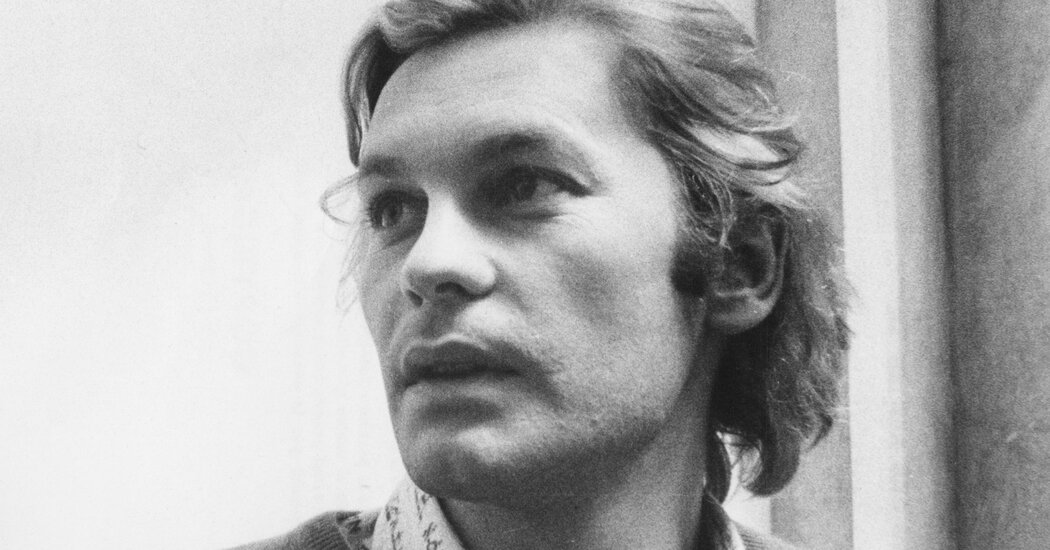
Helmut Berger, a handsome Austrian movie star who was best known for appearing in three feature films by the Italian neorealist director Luchino Visconti, his lover for a dozen years, died on Thursday at his home in Salzburg. He was 78.
His death was announced by his agent, Helmut Werner, who did not give a cause.
“Many years ago,” Mr. Werner said in a statement, “Helmut Berger told me, ‘I have lived three lives. And in four languages! Je ne regrette rien.’”
Mr. Berger was studying Italian in Perugia in 1964 when a friend introduced him to Mr. Visconti, who was on location directing a film that starred Claudia Cardinale.
“I was there watching, I was fascinated,” he told the website Europe of Cultures in 1988. “I wanted to see how they shot a film.”
They began a relationship soon after that, personal as well as professional. Mr. Visconti cast Mr. Berger in “The Damned” (1969), the story of a German steel family, inspired by the Krupps, in the early years of the Third Reich.
As Martin, the grandson of the family’s patriarch, Mr. Berger imitates Marlene Dietrich in full costume during a party for his grandfather, which ends with word of a fire at the Reichstag. Martin later molests younger relatives and rapes his mother (Ingrid Thulin).
Ann Guarino, reviewing the movie for The Daily News of New York, said Mr. Berger personified the “outright perversion” of Nazism. Vincent Canby of The New York Times wrote that Mr. Berger “gives, I think, the performance of the year.” He was nominated for a Golden Globe Award for most promising male newcomer.
Mr. Berger said that working with Mr. Visconti was like being onstage.
“You don’t do 10-minute, five-minute takes but whole scenes, sometimes 20 minutes long,” he told The Los Angeles Times in 1970. “He uses three cameras so you never know which one is on you. You get really into it, the whole atmosphere. He doesn’t limit you, he wants you to be free.”
Mr. Berger appeared in two more feature films directed by Mr. Visconti: “Ludwig” (1973), in which he played the mad 19th-century king of Bavaria, for which he won a David di Donatello Award, the Italian equivalent of the Oscar; and “Conversation Piece” (1974), which starred Burt Lancaster as an art historian living quietly in Rome whose life is changed by several people, including a pushy marchesa and her gigolo lover, played by Mr. Berger.
Mr. Canby had a radically different assessment of Mr. Berger’s work this time, calling him “a lightweight” who “can function no more than as an ideogram for decadence.”
By then, Mr. Berger and Mr. Visconti had been living together for some time.
“During the 12 years with Luchino Visconti, I was faithful,” he told Gala magazine in 2012.
“But were you dating model Marisa Berenson at the time?” the magazine’s interviewer asked.
“Of course, I’m bisexual,” he said. “This is not a problem.”
Mr. Berger fell into a deep depression after Mr. Visconti’s death in 1976.
“At first I drank a lot, gluckgluckgluck, and then the pills came,” he told Gala. “My housekeeper wasn’t supposed to come until 5 p.m. but happened to drop by at 10 a.m. and saved me.”
Helmut Berger was born Helmut Steinberger on May 29, 1944, in Bad Ischl, Austria. His parents, Hedwig and Franz Steinberger, ran a hotel.
Fleeing his father, who he said was brutal to him, Helmut moved first to England and then to Italy, where he made his film debut in “The Witches” (1967), an anthology movie consisting of five stories, each made by a different director. He played a hotel page in the segment directed by Mr. Visconti.
After a few other films, including “The Damned,” Mr. Berger was cast in the title role of Massimo Dallamano’s “Dorian Gray” (1970), which billed itself as a “modern allegory” based on Oscar Wilde’s “The Picture of Dorian Gray” set in sexy present-day London. He was one of a reported 500 actors who auditioned.
Mr. Berger “gives a trance-like performance, looking simply beautiful — if you like the type,” Ms. Guarino wrote.
He continued to work, mostly in Europe, until a few years ago. He notably played the sickly son of a rich Jewish family facing Fascism in Italy in Vittorio De Sica’s “The Garden of the Finzi-Continis” (1970), which won the Oscar for best foreign-language film, and the playboy who seduces Elizabeth Taylor’s character after she undergoes cosmetic surgery in “Ash Wednesday” (1973).
He also portrayed the millionaire boyfriend of Fallon Carrington (Pamela Sue Martin) on “Dynasty,” the prime-time soap, in a story arc from 1983 to 1984, and the Vatican’s chief accountant, who tries to swindle Michael Corleone, in “The Godfather III” (1990).
Information about survivors was not immediately available.
Mr. Berger was known for his jet-setting lifestyle, for being photographed by Andy Warhol, for being linked to women like Bianca Jagger, and for being called “the most beautiful man in the world” in the German media.
But when Gala interviewed him after the publication of the book “Helmut Berger: A Life in Pictures,” he said he was no longer seeking his earlier life’s social hustle and bustle.
“I’ve experienced everything,” he said. “I don’t feel like Helmut Berger, either; I’m not him. It’s a stage name. My name is Helmut Steinberger. And that’s what I’ll be until I’m dead.”













